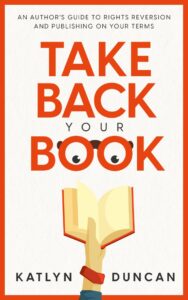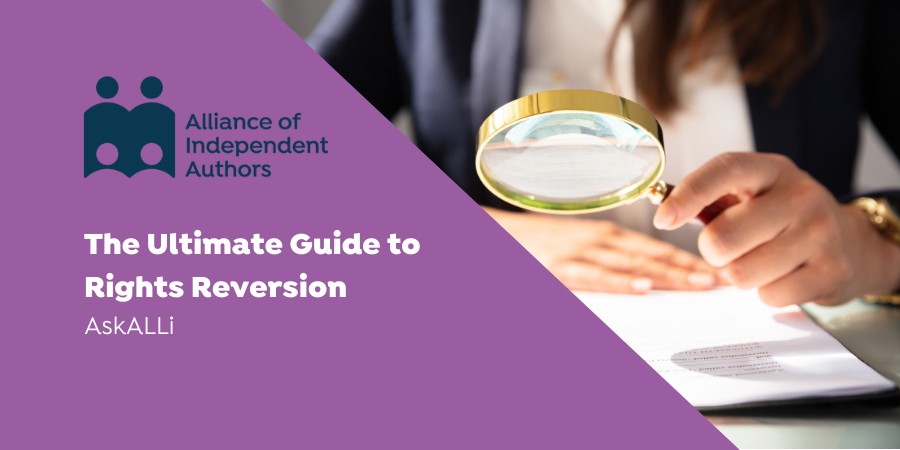For many authors, it’s their dream to sign a contract with a publisher and see their work on the shelf of their favorite bookstores. But what happens after publication when your “season” is over, the book doesn’t sell the way you want and you’re not making the money you want? Sure, you can ask your publisher to promote your books, but for most authors, it’s up to you to do a majority of the promotion. Today's post looks at rights reversion. Thanks to Alliance of Independent Authors member Katlyn Duncan and ALLi advisor and literary agent Ethan Ellenberg.

ALLi member, Youtuber and Author, Katlyn Duncan
What is Rights Reversion?
Katlyn Duncan is a multi-published hybrid author of adult and young adult fiction and has ghostwritten over 40 novels for children and adults. When she’s not writing, she’s obsessing over many (many) television series’, and hanging out on YouTube where she shares her writing process and all the bookish things. Find out more about Katlyn on her website, Youtube, or read her latest book, Take Back Your Book.
There’s an important clause within a publishing contract that allows you to get some or all of your book rights back, and that is the reversion of rights clause.
This clause gives the author power to request the rights to their work to revert back to them as creator. At which point, they can do what they like with their rights. These clauses come in many forms, and each contract is different depending on if the author or their literary agent negotiated the language prior to signing.
“The rise of Indie book publishing, predicated on the emergence of the internet and the ebook, has also caused a seismic shift in the options and strategies for long term traditional Authors and their agents.Traditional Authors can revert print rights from their underperforming traditional partners and successfully re-publish these neglected or even out of print works. There are opportunities even beyond the traditional print rights, many traditional publishers retain the licensing rights to audio, translation and other key additional rights under these old agreements. These rights can also be reverted and exploited by the Author even when the print rights cannot be reverted.The legal metric for reversion has changed and Authors should make their reversion requests based on not only the original contract language but also on current practise. Beyond the legal basis for reversion, Authors should just ask. Many publishers will be reasonable in their responses to Authors who can make a good case to reclaim their rights.”
Rights Reversion Thresholds
The thresholds of this clause can vary based on a set number of years after publication date, and also have a monetary or unit-based requirement. For example, your clause may state that you can request reversion three years after publication date, if the book has sold less than $100 in the last twelve months. Again, these are different among contracts, but I suggest looking for a clause along those lines.
If you have trouble understanding the language of your contract, I suggest speaking with your agent or hiring a literary lawyer to decipher how to proceed.

Take Back Your Book by Katlyn Duncan
Rights Reversion Process
Let's say you’re within your right to request reversion, how do you do that?
Getting your rights reverted can be as simple as writing an email to your editor or the publisher’s contracts department. The bare bones of the letter should include:
- The contract (sometimes they will have an identifying number)
- Title of the book
- Sub-rights that you want reverted
The more succinct and to the point you are, the better. You want to give your publisher evidence of lack of sales within the amount of time they had set in the contract.
Rights Reverted—So What Next?
While you’re waiting to hear back, there are a lot of considerations to think about for your book. Is this a book that you want to keep working for you? If so, do you want to re-publish it to make you money for years to come or use it as a freebie to draw readers onto your newsletter (commonly referred to as a reader magnet)?
Either way, you should take steps to carve a fresh path for that book. You will most likely need to hire a cover designer or purchase a pre-made cover. Sometimes, a publisher will offer the cover rights with added compensation for the licensing of the images and files. But, if it’s been years since publication, you may consider letting go of that cover in favor of the opportunity to embrace current cover trends for your genre.
Then, decide if you want to publish the book as is or do some light or heavy editing. Editing a book will bring into consideration the types of editors you need for that project, whether that’s developmental, line editing, or copyediting.
Next is researching how to self-publish a book. There are a lot of nuances with becoming your own publisher, but the rewards are much sweeter once you publish as the full rights holder.
Mistakes to Avoid with Rights Reversion
Some mistakes to avoid with rights reversion are:
- Make sure you are in your reversion period. As I mentioned above with thresholds, you want to be sure you are eligible to ask for reversion. You’re almost going to guarantee a rejection if you haven’t met those thresholds. You want a compelling case for the publisher to give your rights back, and this is when patience is key.
- Following up on your original request. It can take months for a publisher to respond to your request. There may be a lot of work behind the scenes for them, but don’t let your request go unanswered. If you haven’t heard in about six months, you or your agent should nudge to make sure you are top of mind for getting your rights back.
- Keeping all your production files and paperwork. Some contracts give the author the opportunity to purchase production files from the publisher. If they don’t give you that option or the cost is too much, go back to the most recent version of the work and edit yourself to get the book ready for publication. Also, print or save the acceptance of reversion from your publisher. Some authors have had trouble proving that they’ve had their rights reverted from various vendors and you’ll need that official letter/email to show the vendor that you, in fact, hold all the rights to publish the work.
Top Rights Reversion Tips
There are many lessons to learn with rights reversion, and the more you do it, the easier it will become, until you are an unstoppable author who has full control over their books.
- Make sure all your book files are down from vendors prior to republishing. It’s the job of the publisher to take down their versions of the books from the retailer websites. If they are still selling your book after reversion, they are making money from that work. Again, if you see this, be sure to follow up with your agent or publisher contact to get all copies removed from websites.
- Self-publishing differs from formal publishing. While this may be a concept you are aware of, the nuances of self-publishing involve much more work than what you may be used to from a traditional background. Research books, courses, and videos that will help you understand the process from start to finish. The opportunities for your book are endless, but so are the tasks now that you are publishing this book on your own.
- Know what rights you are willing to give up. Because you have taken your rights back on your book, that doesn’t mean you have to leave traditional publishing entirely. At this point, you have learned a lot about the business of publishing, and if you have republished your book, you’re aware of the control you have, and the larger percentage of money you can earn. Take that knowledge with you to negotiate any future contracts you may get from a publisher.
You came into the publishing business to share your stories with the world. While you may have had a different outcome in mind for your book, know that with rights reversion you don’t have to settle for that first home for your book. You can take control once more and give your book the life you’ve always wanted for it.
Learn more about rights reversion and how to take control of your books in “Take Back Your Book: An Author’s Guide to Rights Reversion and Publishing On Your Terms” by Katlyn Duncan.
ALLi Member Experiences
Ann Richardson
After experiencing low royalty checks emailed her editor, with a friendly request for her rights back. Ann said
“I expected it would be weeks before I heard from her. In fact, I had an email within two hours saying that they would be happy to revert the rights, with no cost. Indeed, it took less than three weeks for the contractual issues at their end to be sorted and a formal letter to be prepared and signed by the publisher and myself. Moreover, they not only sent me a pdf of the book, but all the spare paperback copies lying around, free of charge. A surprising bonus. That book has now been re-launched on Amazon with an updated preface and a new cover, for £2.99. I can happily report that it is selling 3-4 a week, instead of 3-4 a year.”
Wendy H. Jones
“Initially there was discussion that I would need to pay for the rights but in the end the publisher just gave me the formatted interior file PDF's and a letter saying the rights had reverted to me. If I wanted to keep the original covers I would have to pay, however, I wanted to get new covers. I was going to self publish but another publisher stepped in and said they would like to publish them. As the contract was good, I signed it. The whole process was highly professional and an altogether pleasant experience. The whole thing was prompt and not in the least stressful. Everyone involved discussed and agreed everything.”
“I had two books published by Hodder Arnold and when they went ‘out of print’ I applied for the rights – it was in my contract that I could do this if they were out of print for 12 months. Although it took quite a while and lots of phone calls etc. it worked out ok and I self published both books with new titles and images as I did not have rights to the previously used images – only the text. It was a good opportunity to update the books (both non-fiction health related books). I self published both on KDP (it was called Create Space then!) and used a professional formatted and cover designer. I have made more in royalties than I ever did with Hodder!”
“I’m currently in the process of revising for self publication a book for which the rights have reverted. My publisher has been great about the whole thing – we have had a very good relationship- but I did fight hard when we were first doing the contract, way back in the early 2000s – even though I hate confrontation and found that difficult. (I had been a journalist, so I had a sense of the value of my rights, thankfully – even though I never could have foreseen where self publishing would be, 20 years later.)”
“Yes, it was tortuous, and I had a difficult time, but was supported well by the ALLi team who coached me along the way as my then publisher was being very difficult. I now have my copyright back, updated and revised the book, new title and cover and it's out there as a paperback and ebook. Happy and learned a lot.”
“I've bought back the rights from four different publishers over the years. The reasons, processes, and outcomes differ in each case. In all cases I approached with respect, thanking them for their attention to my books, pointing out that sales had dropped to the point that they could be considered out of print, and said that I'd like to take back the rights not to sell to another publisher but to self-release. The first publisher, in Hong Kong, responded quickly and said if I bought their remaining stock at cost (less than wholesale), they'd happily return the rights.
Publisher 2, in New York, responded with rage, blaming me for the lack of sales and calling me all sorts of names, how DARE a MERE author ask for such a thing? I responded calmly, offering to buy their remaining stock at cost. They responded with surprise and repressed delight to be rid of all those unsold books.Publisher 3 was the UK publisher of the above book. I politely told them that I had reclaimed the rights from the US publisher, which included their prior interest in foreign rights, and therefore, as the rights holder I was politely asking them to revert the rights. They refused, saying they'd heard nothing from the US publisher. I went back to the US publisher and begged and pleaded for a letter to prove it, which they gave me. Still the UK publisher refused. So I pulled my reserve card from my sleeve. The book in question was an illustrated book, 50 short chapters and 50 cartoons by me. The original contract with the US publisher had a clause forbidding any tampering with the artwork without my written consent.This applied to all ancillary editions.The UK publisher had released my book without a single cartoon, a clear violation of the contract. At the time my agent advised me not to pick a fight. But now, years later, I pulled it on them, saying they'd violated the contract in any case, which meant the rights should have reverted to me. They went ballistic, calling me all sorts of nasty names, saying I'd be blacklisted throughout the London publishing business, and so on. I persisted, offering to buy their remaining stock again. They quite rudely gave in, demanding full wholesale price. I bargained them down a bit, bought their stock and destroyed it.Publisher 4, in the USA, had contracted to release an updated version of a previously self-published book. They gave me a fine advance. When it came out, they overpriced it to three times what it should have cost, did nothing whatsoever to promote it. I'm embarrassed but also amused to report that in two years they sold precisely 3 copies. To add insult to injury, their e-book version was so badly formatted that I got two e-mails complaining about it. To each of these, I sent, at my own expense, a signed print copy. I was disgusted. I told the publisher I'd refund their advance and get the rights back. They responded that it was still “in print”. Since they were doing it POD, they had no stock, hadn't made a sale in months, so I contested them. I was polite and restrained throughout. But they wouldn't budge. I finally wrote a heartfelt letter to the CEO, telling him how much this book meant to me personally, and that while I appreciated their faith in it, it clearly didn't match their own strategies. They gave in.In the cases of publishers 2, 3, and 4, the books that were reverted to me sold more copies in a month than any of them had sold in two years, because I priced them right and promoted them.
Lessons learned? Don't trust publishers to give a damn about promoting your book. But if you did give them your trust and want it back, be gentle, polite, and respectful, even if spittle is hitting you in the face from their screaming.”
“When Our Child Press, publisher of Oliver, a Story About Adoption, went out of business, they wrote to me, restoring all rights to the book to me.”
Simon Whaley
“I claimed my rights back from John Hunt Publishing for two books (The Positively Productive Writer and Photography for Writers). Their contract was clear regarding when I could ask for them back (once annual sales had dropped below 50 a year). I had to buy back any stock, which was less than £100. I've since updated and self-published both books. The process was simple and straightforward. Ironically, when John Hunt Publishing commissioned Photography for Writers, I could not include photos. But my self-published version does (thanks to software like Vellum). I love the fact that getting my rights back allows me to self-publish the book that I wanted to in the first place.”
“I took rights back for my first book in 2016 from a now defunct midsize publisher, and it was easy-peasy. Just make sure there's an out-clause in your contract (and I had a rights attorney review my contract before I signed – everyone should do this) that makes sense to you. I had to pay $500 or $600 to the publisher… and it was absolutely worth it to me.”
“I got my rights back on my first two books, which were published by Random House’s Alibi imprint. There was a clause in my contract that stated after 3 years, I could request the rights back if the book had sold less than 100 copies in the past 12 months. I contacted my agent and she handled the nitty gritty. Took a couple months to process.”
Bill Munro
“My first book was published by Crowood in 1998 and was the history of a UK car company, Carbodies Ltd. In 2010 the company’s CEO (it was by this time London Taxis International, LTI) asked Crowood if they could buy some copies, to be told it was out of print. They then suggested that a second, updated edition might be produced, to which Crowood‘s MD agreed, subject to LTI agreeing to buy a set number of copies. LTI agreed, placed the order and I produced a draft of two additional chapters, based largely on interviews with the CEO and marketing director. I submitted the ms to LTI’s CEO for fact checking, but then the company hit financial difficulties and their interest cooled, as they felt they shouldn’t be seen to be spending cash on such things when they were laying people off.
There were then several changes in the management, including the CEO and the sales and marketing manager. Although all were aware of the book (it had been required reading when new senior admin staff joined the company) the new sales and marketing manager was not aware of the new edition. When I contacted her, she made attempts to get a board decision, but none got the project revived and she eventually left the company.
I approached Crowood and asked for the rights to be returned to me, but the MD said that he wasn’t prepared to do this while he still had an unfulfilled order for the new edition. If LTI were to cancel the order, they would return the rights. I went back to LTI and asked if they still wanted the books and if not, to cancel the order. I failed to get anyone to focus on the story, let alone make a decision.
Eventually the LTI ran out of cash, went into receivership and in 2012 was taken over by a Chinese car maker. They invested hugely, building a new factory and designing new models, but their management kept changing and I couldn’t pin anyone down to make a decision until 2019, when I finally got their legal department to write to Crowood to cancel the order. Crowood then returned my rights and I am now producing a second edition.
It was a protracted situation, made frustrating because it happened through perfectly understandable circumstances about which I could do nothing.”




